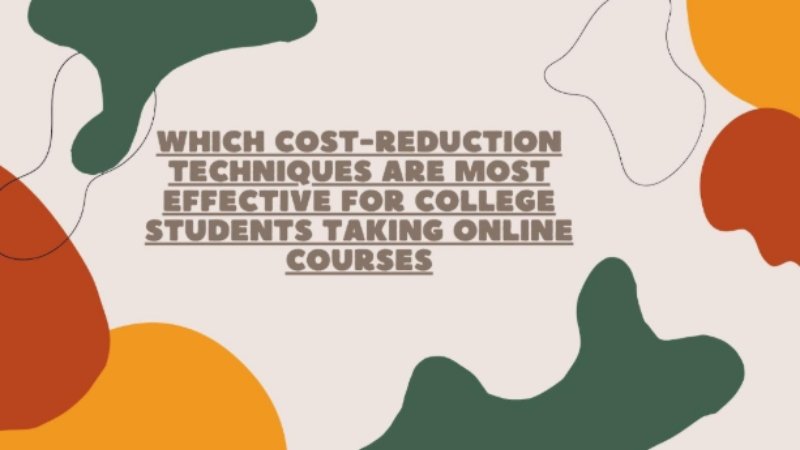Distance education can be an excellent learning opportunity for students because it is simple to access and often much cheaper than traditional educational institutions. Nonetheless, many learners still struggle with managing their finances, particularly when juggling their coursework and family obligations. When the academic pressure of taking online classes becomes too much for them, some could go ahead with an online educational help service. The service where one can easily say, if I pay some money, could an expert take my online course on my behalf? However, online learning can be considerably more affordable and doable with the correct savings techniques, expenditure control, and budgeting techniques.
Online students can save funds, minimize needless loans, and establish a stable economic future with the help of this guide’s realistic, sustainable, and useful advice.
Why Online Students Need to Establish a Budget
In the ideal situation, everyone would have sufficient funds to cover their expenses and basic needs while still having some left over for enjoyment, but that is just not the case. Planning is one of the most important ways to monitor your financial flow if you have a low salary and find it difficult to pay your bills. It is a useful tactic to use since it assists you in determining your priorities and allocating those monies first.
Even while online learning lowers transportation, accommodation, and on-campus expenses, there are still a lot of unstated costs:
- Costs associated with technologies
- Textbooks and other course materials
- Services for subscriptions are required for courses
- Expenditure for the home
- Fees for exams or certifications
Budgeting guarantees that funds are distributed where they are most needed and assists in avoiding waste.
Begin with a Clearly Stated Economic Overview
You must be aware of how much money you have before making a spending plan.
Monitor Your Weekly Earnings
- Wages from full-time or part-time work
- Earning money from freelancing
- Scholarship funding
- Allowances or assistance from family
Include the things you spend every month.
Sort them into two distinct groups:
- Wi-Fi, EMIs, education, and health care are examples of fixed expenditures.
- Dining, travel, school materials, and amusement are examples of variable expenditures.
Make a monthly budget that is affordable for students
A basic structure for budgeting is:
The 50-30-20 Rule
- 50% → Essentials like basic utilities and bills
- 30% → Desires like entertainment and eating out)
- 20% → Money saved for investments and emergencies)
If the cost of your schooling is high, change the rule to:
Essentials: 60; wants: 20; savings: 20
You will become better at managing over time if you evaluate and change your financial plans every month..
Reduce the Cost of Technology and Course Materials
Excessive costs, such as many websites and memberships, can be enticing to purchase as an online learner. The following tactics can help you avoid these mistakes and save expenditures
- Reduce your textbook and supply costs:
The majority of students’ costs are covered by textbooks; therefore, it’s a good idea to save money by borrowing or buying old books, which are much less expensive. In the age of technology, obtaining electronic books online for free or at a fair price is another effective method.
Completely relying on technology for studying and note-taking also reduces the need for paper and books. Last but not least, using the resources available at the library is beneficial because the materials you are using are freely accessible. Sometimes, if you feel that you do not have enough power to attend the classes due to other commitments, you can simply check online and type, Am I allowed to pay someone to do my online class for me? There are numbers of services that helps students at a reasonable price.
Reliable technology is necessary for online learning; however, expensive or high-end versions are not necessary.
How to Save Money:
- Instead of buying an expensive computer, get a refurbished one.
- Instead of purchasing your individual e-books, make use of your campus library membership.
- Teachers frequently receive a 50–100% discount when comparing software plans.
- Instead of buying drives, you could use affordable storage on the internet.
Cut Daily Living Expenses and Food
- Arranging Meals:
Organizing dinners and purchasing products that stay fresher and have a total of two to three servings may cost the same as your one-time outing, so eating at home is less expensive than dining out. Consider purchasing non-perishable items in large quantities and typically choose those that are on sale. For learners, one of their major expenses is food.
Saving Cash Ideas
• Instead of ordering takeaway, try cooking your own food.
• Make a large grocery shopping trip.
• Utilize discounts at the supermarket.
• Create a monthly eating plan to avoid expensive impulse buying.
Keep a record of your monthly dietary costs
- Steer clear of little but common expenses such as:
- Drinks from cafes every day
- Ordering snacks
- Delivery cost
Your pocketbook is stealthily drained by these.
Avoid lifestyle excess.
Online learning may offer greater freedom to plan, but extra free time must be spent wisely.
Avoid raising personal expenses, such as purchasing superfluous or entertainment subscriptions, if you begin earning money in addition to your studies. Instead, put extra cash into savings or emergencies.
- Tech-Aware Savings:
Numerous companies give learners price reductions on broadband services and computers. As a substitute, you could buy refurbished computers and investigate complementary open-source programs.
Public Transit
Even though no one enjoys riding the bus or train, taking public transit or combining transportation can save a significant amount of money. Considering the growing price of petrol, it makes sense to own a seasonal transport or metro pass. Additionally, you already save money on your daily transportation when you are an online learner.
Adopt Effective Study Habits to Prevent Additional Expenses
A poor use of time can result in:
- Another attempt at the course
- Covering the cost of extra educational assistance
- Reduced output
- Burnout in the classroom
- Improved study habits lessen the need for costly academic shortcuts
To maintain effectiveness:
- Set aside time each day to study.
- As an alternative to studying in bed, designate a particular space
- For optimal learning and leisure, employ time-management techniques.
- When learning, refrain from using the internet.
This lowers stress and improves academic achievement without raising expenses.
Create a Fund for Emergencies
Continuity creates assurance, even if it begins modestly—between $300 and $500 a week.
Where to Put Money
- A savings plan for digital envelope budgeting
- SIPs (to ensure long-term financial security)
- You are shielded from unforeseen circumstances by this security barrier.
Side Businesses or Part-Time Employment
Look into ways to make more money. You may add to the pupil’s income by working part-time at an appropriate company or by educating online. This temporary employment interferes with your personal life and may occasionally cause scholastic difficulties as well.
Thankfully, online learning platforms help to lessen the stress of their assignments. This enables pupils to work freelance positions and still have help with schoolwork.
What is the Significance of Ethical Academic Assistance
Some learners might turn to outside resources to complete the online course or get help with specific projects when they are overburdened with their academic duties. Students should nonetheless uphold their own educational duties and honesty, even though irregular academic support may assist them in managing pressure. The acquisition of real skills that are useful in future employment is the fundamental worth of schooling.
One of the most essential abilities a student who studies online can acquire is discipline with money. Studying online may be made affordable and less taxing by meticulously organizing your budget and controlling your way of life. Making prudent financial decisions guarantees that the money you spend on education will pay dividends.
However, there are still moments when the demands of job and school can be too much to handle. Success over the long haul usually comes from persistent individual endeavors and autonomous learning. Some students prefer to ask the question, Can I pay someone to take my online class so that I can get some relief from the burden of all the daily work. At Disquantified.com, we believe that true creativity starts with the heart, and when shared with purpose, it can leave a lasting mark.

